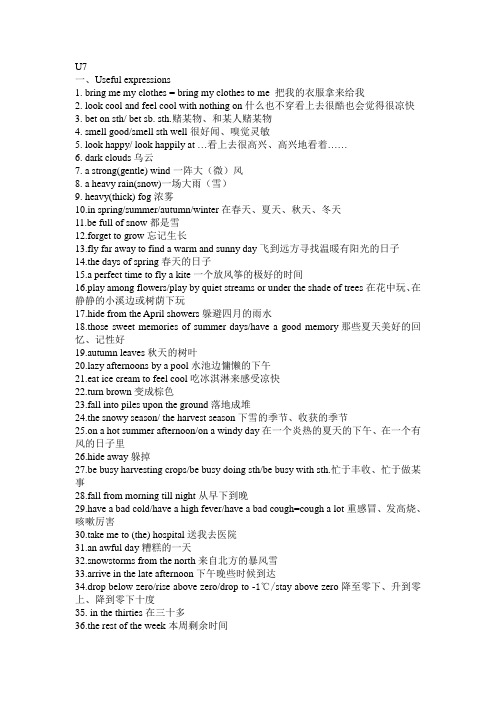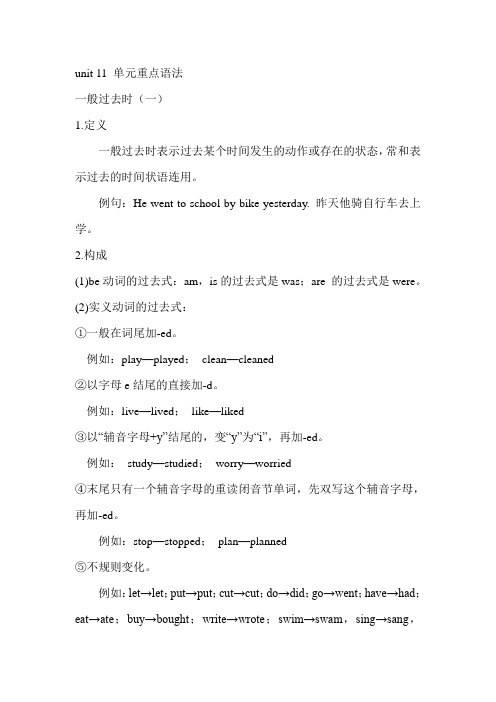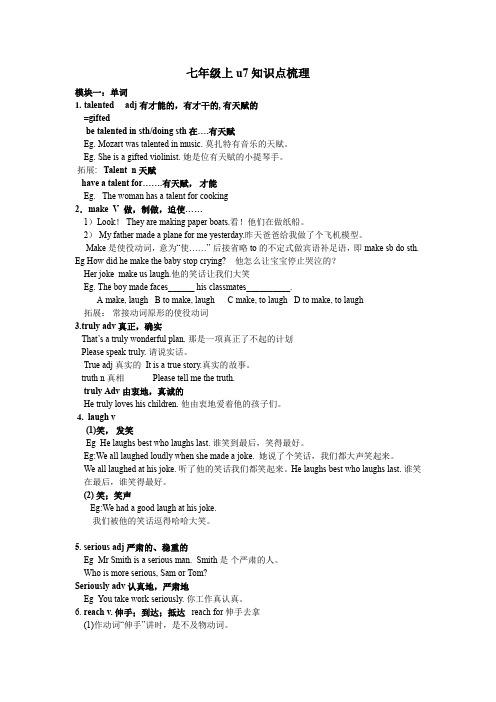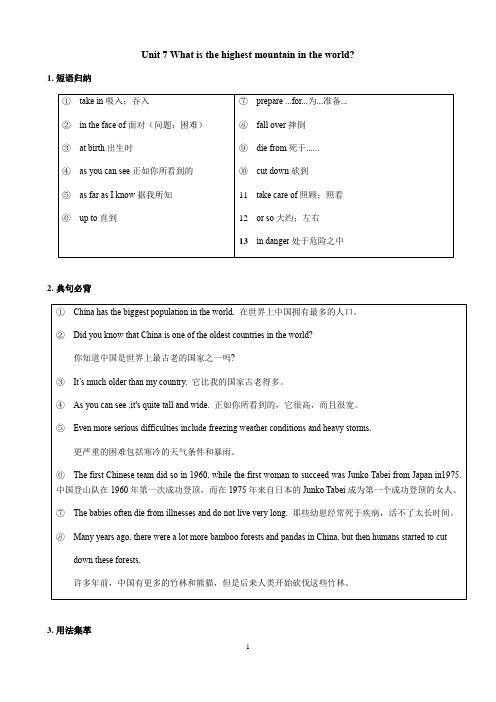U7-11语法
- 格式:doc
- 大小:49.00 KB
- 文档页数:4

八年级上册英语U7知识点总结Unit 7主题是"The world around us",旨在帮助学生掌握和运用有关自然地理和环境保护的知识,同时追求全面发展学生语言技能。
本单元的学习和探究需要学生运用听、说、读、写四种语言技能,它是一个厚重而宽广的单元,因此,我们需要将知识点进行归纳整理,以方便学生掌握和记忆。
一、重点短语和句型1. be located in:位于例句:Beijing is located in the north of China.2. take a photo/picture:拍照片例句:They took a lot of photos when they traveled to London.3. be famous for:因...而闻名例句:Paris is famous for its Eiffel Tower.4. be famous as:被称为例句:Li Na is famous as a tennis player.5. make a speech:发表演讲例句:The president made a speech at the ceremony.6. be made up of:由...组成例句:The forest is made up of many kinds of trees.7. be divided into:分成...例句:The book is divided into three parts.8. protect the environment:保护环境例句:We should all protect the environment.9. pollute the environment:污染环境例句:Smoking will pollute the air.10. get rid of:摆脱例句:I need to get rid of these old books.11. turn off:关上例句:Please turn off the lights when you leave.12. turn on:打开例句:Can you turn on the TV for me, please?二、重点单词1. earthquake:地震例句:The earthquake destroyed the buildings in the city.2. flood:洪水例句:The flood caused severe damage to the city.3. drought:干旱例句:The drought made it difficult for farmers to grow crops.4. hurricane:飓风例句:The hurricane destroyed many houses in the area.5. pollution:污染例句:The pollution in the river is getting worse.6. environment:环境例句:We need to protect the environment for future generations.7. recycle:回收利用例句:We should recycle more to reduce waste.8. energy:能源例句:Solar energy is a clean source of energy.9. population:人口例句:The population of the city is growing rapidly.10. global warming:全球变暖例句:We need to take action to reduce global warming.三、重要语法点1. 现在进行时的用法现在进行时表示正在进行的动作。

U7一、Useful expressions1. bring me my clothes = bring my clothes to me 把我的衣服拿来给我2. look cool and feel cool with nothing on什么也不穿看上去很酷也会觉得很凉快3. bet on sth/ bet sb. sth.赌某物、和某人赌某物4. smell good/smell sth well很好闻、嗅觉灵敏5. look happy/ look happily at …看上去很高兴、高兴地看着……6. dark clouds乌云7. a strong(gentle) wind一阵大(微)风8. a heavy rain(snow)一场大雨(雪)9. heavy(thick) fog浓雾10.in spring/summer/autumn/winter在春天、夏天、秋天、冬天11.be full of snow都是雪12.forget to grow忘记生长13.fly far away to find a warm and sunny day飞到远方寻找温暖有阳光的日子14.the days of spring春天的日子15.a perfect time to fly a kite一个放风筝的极好的时间16.play among flowers/play by quiet streams or under the shade of trees在花中玩、在静静的小溪边或树荫下玩17.hide from the April showers躲避四月的雨水18.those sweet memories of summer days/have a good memory那些夏天美好的回忆、记性好19.autumn leaves秋天的树叶zy afternoons by a pool水池边慵懒的下午21.eat ice cream to feel cool吃冰淇淋来感受凉快22.turn brown变成棕色23.fall into piles upon the ground落地成堆24.the snowy season/ the harvest season下雪的季节、收获的季节25.on a hot summer afternoon/on a windy day在一个炎热的夏天的下午、在一个有风的日子里26.hide away躲掉27.be busy harvesting crops/be busy doing sth/be busy with sth.忙于丰收、忙于做某事28.fall from morning till night从早下到晚29.have a bad cold/have a high fever/have a bad cough=cough a lot重感冒、发高烧、咳嗽厉害30.take me to (the) hospital送我去医院31.an awful day糟糕的一天32.snowstorms from the north来自北方的暴风雪33.arrive in the late afternoon下午晚些时候到达34.drop below zero/rise above zero/drop to -1℃/stay above zero降至零下、升到零上、降到零下十度35.in the thirties在三十多36.the rest of the week本周剩余时间37.daytime temperatures白天气温38.the highest temperatures/the lowest temperatures最高气温、最低气温39.during this time of year/at this time of year在每年的这个时候40.between 21 and 26在21和26之间41.a bit cold and dry/a bit colder and drier/ a bit of paper有点冷和干、一小张纸42.hear you听到你说话43.speak louder高声说44.take care保重45.cover one’s face with scarves/masks用围巾(口罩)遮住脸46.make people sleepy让人犯困47.the sudden heavy rain突如其来的大雨48.cause a lot of problems引起很多问题49.the best season of the year一年中最好的季节50.have a short trip around the city at the weekend周末在城市周围短途旅行51.most children = most of the children大部分孩子52.like snowball fights/have snowball fights喜欢打雪仗53.shiny shoes/shining stars闪闪发亮的鞋子、闪闪发光的星星54.a sleepy boy/a sleeping boy/fall asleep犯困的男孩、睡着的男孩、入睡55.have to wear thick warm clothes必须穿厚厚的保暖的衣服56.enjoy the winter here in Harbin喜欢哈尔滨这儿的冬天57.be covered in deep white snow/be covered with deep white snow被厚厚的白雪覆盖58.frozen lakes and rivers/icy roads冰冻的湖泊河流、冻冰的马路59.during this season在这个季节60.see beautiful flowers or green trees看见美丽的花或绿树61.the land土地62.my friends and I我和我的朋友63.love playing outside in winter喜欢冬天在外玩64.throw snowballs at each other 互相扔雪球65.make snowmen堆雪人e carrots for their noses用胡萝卜做他们的鼻子67.enjoy the Ice Festival each year喜欢每年的冰节68.beautiful ice lanterns everywhere到处美丽的冰灯二、Useful sentences1.I bet you’ll look cool and feel cool with nothing on!(1)I bet that +从句,表示:我打赌…,我敢说…(2)Sb look adj in sth./ sth look adj. on sb.表示某人穿上…看上去…2.询问天气的句型有:What was the weather like yesterday? = How was the weather yesterday? What’s the weather like today? = How is the weather today? What will the weather be like tomorrow? = How will the weather be tomorrow?回答天气情况有以下几个句型(时态就不一一列举了):(1)There be +n. (+地点+时间)(2)It be +adj. (+地点+时间)(It指代天气)(3)It +rain/snow(各种时态形式)+(地点+时间)【因为rain/snow可以作动词】如:明天常州会下雨There will be some rain in Changzhou tomorrow. = It will be rainy in Changzhou tomorrow. = It will rain in Changzhou tomorrow.3.Winter days are full of snow.冬日满是雪。

unit 11 单元重点语法一般过去时(一)1.定义一般过去时表示过去某个时间发生的动作或存在的状态,常和表示过去的时间状语连用。
例句:He went to school by bike yesterday. 昨天他骑自行车去上学。
2.构成(1)be动词的过去式:am,is的过去式是was;are 的过去式是were。
(2)实义动词的过去式:①一般在词尾加-ed。
例如:play—played;clean—cleaned②以字母e结尾的直接加-d。
例如:live—lived;like—liked③以“辅音字母+y”结尾的,变“y”为“i”,再加-ed。
例如:study—studied;worry—worried④末尾只有一个辅音字母的重读闭音节单词,先双写这个辅音字母,再加-ed。
例如:stop—stopped;plan—planned⑤不规则变化。
例如:let→let;put→put;cut→cut;do→did;go→went;have→had;eat→ate;buy→bought;write→wrote;swim→swam,sing→sang,begin→began过去原形加“ed”,词尾有e只加“d”;辅音之后y结尾,y要变i 加“ed”;词尾重读闭音节,双写辅音加“ed”。
过去分词过去式,不按规则也有些。
3.句型(1)含be动词过去时的句型:其否定句是在was/were后加not,其一般疑问句和特殊疑问句是把was/were提到主语前。
例句:—Were you at home yesterday?—Yes,I was./ No,I wasn't.(2)含实义动词过去时的句型:①肯定句:主语+动词过去式+其他.②否定句:主语+did not (didn't)+动词原形+其他.③一般疑问句:Did+主语+动词原形+其他?(其肯定回答用“Yes,主语+did”,否定回答用“No,主语+didn't.”)④特殊疑问句:疑问词+did+主语+动词原形+其他?。

七年级上u7知识点梳理模块一:单词1.talented adj有才能的,有才干的,有天赋的=giftedbe talented in sth/doing sth在….有天赋Eg. Mozart was talented in music.莫扎特有音乐的天赋。
Eg.She is a gifted violinist.她是位有天赋的小提琴手。
拓展:Talent n天赋have a talent for…….有天赋,才能Eg.The woman has a talent for cooking2.make V做,制做,迫使……1)Look!They are making paper boats.看!他们在做纸船。
2)My father made a plane for me yesterday.昨天爸爸给我做了个飞机模型。
Make是使役动词,意为“使……”后接省略to的不定式做宾语补足语,即make sb do sth. Eg How did he make the baby stop crying?他怎么让宝宝停止哭泣的?Her joke make us laugh.他的笑话让我们大笑Eg.The boy made faces______his classmates__________.A make,laughB to make,laughC make,to laughD to make,to laugh拓展:常接动词原形的使役动词3.truly adv真正,确实That’s a truly wonderful plan.那是一项真正了不起的计划Please speak truly.请说实话。
True adj真实的It is a true story.真实的故事。
truth n真相Please tell me the truth.truly Adv由衷地,真诚的He truly loves his children.他由衷地爱着他的孩子们。

Unit 7 What is the highest mountain in the world?1.短语归纳2.典句必背3.用法集萃(1)China has the biggest population in the world. 在世界上中国拥有最多的人口。
❖population作名词,意为“人口;人口数量”。
表示“人口多”时要用big或large来修饰population;表示“人口少”时要用small来修饰population。
例:Our country has a large population and abundant resources. 我国人口众多,资源丰富。
We have a growing population and therefore we need more food.我们的人口数量在增长,因此我们需要更多的食物。
❖拓展询问“某地有多少人口”时,要用what,即“What’s the population of+地点?”。
注意该句式中的特殊疑问词不能用“how many或how much”。
例:—What’s the population of Hong Kong? 香港有多少人口?—Sorry, I don’t know. Let’s ask Mr. Lee. 对不起,我不知道。
我们问问李老师吧。
(2)Did you know that China is one of the oldest countries in the world?你知道中国是世界上最古老的国家之一吗?❖“one of+the+形容词最高级+复数名词”意为“最...的...之一”例:The Nile is one of the longest rivers in the world. 尼罗河是世界上最长的河流之一。
Miss Wang is one of the most popular teachers in our school.在我们学校,王老师是最受欢迎的老师之一。

七年级unit7语法知识点在七年级英语学习中,Unit 7是一个重要的环节。
本文将为大家介绍七年级Unit7中的语法知识点,包括动词时态、被动语态和虚拟语气,帮助大家更好地学习英语。
动词时态动词时态是指动词表示的动作发生的时间。
在英语中,动词时态分为一般现在时、一般过去时、一般将来时、现在进行时、过去进行时和将来进行时等多种。
其中一般现在时是最基本和常用的时态形式。
一般现在时通常用来表示经常性的、习惯性的或常发性的动作,还可以表示客观的事实和普遍规律等。
动词的一般现在时变化规则如下:肯定句:主语 + 动词原形(第三人称单数要加-s)例句:I study English every day.否定句:主语 + do not / does not + 动词原形例句:She does not like swimming.疑问句:Do / Does + 主语 + 动词原形?例句:Do you often watch TV?被动语态被动语态是指动作的承受者在句子中作为主语,而动作的执行者则不是主语。
在被动语态中,谓语动词用被动形式,即be动词的不同形式,一般是am,is,are,was,were等。
被动语态的构成方法如下:肯定句:主语 + be动词(am,is,are,was,were)+ 过去分词例句:The book is written by him.否定句:主语 + do / does / did + not + be动词(am,is,are,was,were)+ 过去分词例句:The letter was not sent on time.疑问句:Be动词(am,is,are,was,were)+ 主语 + 过去分词?例句:Was the message left by him?虚拟语气虚拟语气表示假设、愿望、建议、命令、要求等语气。
在虚拟语气中,谓语动词的形态常常需要变化,尤其是用动词的过去式或其它非实际时态的动词形式。
人教版七年级下册英语 Unit 11 语法知识点精讲(全面!)11 How was your school trip?知识点大全SA语法:一般过去时一、什么是一般过去时?一般过去时是用于表述“过去”的时态。
1. 表示过去发生的动作。
2. 表示过去发生的状态。
二、一般现在时与一般过去时的共同点一般过去时的句式在结构上与一般现在时的句式结构是完全相同的。
无论是陈述句还是疑问句均是如此。
因而学好了一般现在时的知识,再学习一般过去时的知识是非常容易的。
三、一般现在时与一般过去时的区别。
区别体现在句子的谓语动词上。
因为句子的时态要通过谓语来体现。
而谓语由动词充当。
因此一般过去时中必然要出现用来“体现过去”的谓语动词。
辨析:“过去时”与“过去式”“过去时”是指的句子的时态。
本单元我们研究的是“一般过去时”。
“过去式”是指的动词的过去式,是一种拼写上的形式。
重要说明接下来介绍的一般过去时与一般现在时在陈述句,一般疑问句及特殊疑问句中的关系时所给的例句均不涉及时间状语。
(若加入了时间状语的话情况就更复杂一些,以后慢慢积累即可)语法:一般过去时的陈述句结构与一般现在时陈述句结构的关系一、主系表结构的情况。
1)肯定句。
I am a student.—> I was a student.You are young.—> You were young.I feel well.—> I felt well.She looks good.—> She looked good.2)否定句。
I am not a student.—> I was not a student.You are not young.—> You were not young.特殊说明:含有感官系动词的肯定陈述句在变为疑问句和否定句时需要当做实意动词处理。
这句话的变化例子放在后面实意动词单独作谓语的板块中出现。
总结:此类结构中,将系动词变为其过去式,句子的时态即变成了一般过去时。
U7 复习一、短语1.be in danger 处于危险中2.environmental problems 环境问题3.the greenhouse effect温室效应4. a kind of一种;某种5.act like 行为举止像;表现得像6.let … in/out 使…进入/出去7.keep/stop/prevent sb/sth from doing sth.阻止某人/某物做…8.in the form of…以……的形式9.keep in…保留……10.cause something to do something 引起…做某事11.take in 吸收12.hold sb/sth together 使…结合在一起;使…团结13.mountains of 堆积如山的,大量的14.in one’s +整十的数词复数在某人几十多岁的时候15.throw…away把……扔掉16.in order to do sth 目的是;为了做某事17.imagine doing sth. 想象做某事18.answer to…什么的答案19.give up (doing) sth. 放弃20.get/ go back to 回到…, 回归…21.have a bright future 有一个美好的未来22.get/ have sth. done. 让…完成/做23.not … until 直到…才(主将从现)24.as soon as possible 尽快25.pay a fine of… 赔一笔……的罚款26.go to prison 坐牢27.prefer (doing.) sth. / prefer to do. sth.宁愿做某事28.instead of 代替29.the Whites怀特一家30.be the same as 与…一样31.be different from 与…不同32.wa rm … up 热身,使…活跃起来33.give a reason 说明原因34.know of... 知道…; 熟悉…35.Environmental Protection Bureau环保局36.waste materials废料37. a building site 建筑工地rm sb. of / about sth. 通知某人关于…39.take actions 采取行动40.deal with 处理41.put out 熄灭;扑灭42.be good/bad for对……有好处/坏处43.thousands of数千的;成千上万的44.take/have a holiday 度假45.as you know正如你所知道的二、词汇1.consume (n.) consumer2.dangerous (n.) danger3.environment (adj./adv.) environmentalenvironmentally4.imagination (v.) imagine5.warm (n.) warmth6.hot (n.) heat7.importance (adj.) important8.life (adj.) lifeless9.pollute (n.) pollution10.harm (adj.) harmless/harmful11.friend (adj.) friendly12.breath (v.) breathe13.recent (adv.) recently14.wealth (adj.) wealthy 15.health (adj.) healthye (adj.) useful/useless17.reduce (n.) reduction18.produce (n.) product19.improve (n.)improvement20.science (n.) scientist21.difference (adj.) different22.neighbour (n.) neighbourhood23.prefer (n.) preference24.direct (n.) directorrmation (v.) inform26.act (n.) action27.tour (n.) tourist28.protect (n.) protection29.chemistry (n./adj.) chemical三、语法1. much too, too much, too many2. reach, arrive in/at, get to3. prefer 的用法prefer A to B = like A better than Bprefer doing sth. to doing sth= prefer to do sth. rather than do sth.eg. Mary likes swimming better than skating.= Mary prefers swimming to skating.= Mary prefers to swim rather than skate.4. why & because1)疑问词why用于询问原因,回答时用because引导。
七年级英语unit11精学笔记精学要求1.每个例子后面要对子互讲。
2.每一知识点,都要求互检互签,互检在知识点的右侧空白处签上检查人员的名字。
精学笔记基础知识一单词1挤奶 ________ 2奶牛_________3马_______ 4喂养_______5农民_________ 6相当,完全_____ 7任何东西_______8种植,生长________9农场_______ 10采摘________11极好的;优秀的__________ 12乡村;农村___________13昨天___________ 14花__________ 15担心________ 16幸运的_______17太阳_________18火灾_____________19博物馆_________ 20油画________ 21使人兴奋的__________22可爱____________23昂贵的____________24便宜的______________25缓慢的___________ 26快的_______27机器人_______28导游_______29礼物_______30所有事物___________31感兴趣的_____________ 32黑暗的_________ 33听见__________知识点一精炼:1.—What’s your father’s job?--He’s a _______(farm).2.There are some ___ and ___ in the fridge(冰箱)。
A .tomatos ; milk B. tomatos ; milksC. tomatoes ; milkD. tomatoes ; milks互检互签__________基础知识二:短语1去散步______________ 2给奶牛挤牛奶______ ____ ______3骑马_________________ 4喂鸡__________ _____________5与......谈话__________________ 6拍照_______ _____ ________7相当多;许多_______ _____ ____ 8带领......参观_______________9了解___________________知识精练:1.Mr.Li gave me too much help this time.(改写同义句)Mr . Li helped me ______ ______ ______ this time.2.We showed our press cards(采访证)__the old man , and then he showed us _____ his old house happily.A . to ; to B. with ; aroundC . to ; aroundD . with ; to10.从...到..._______________11.种植草莓_________________12.采草莓___________________ 13.在乡下___________________ 14.去钓鱼________________ 15.在晚上__________________ 16.许多;大量________________ 17.出来_______________ 18.学校郊游________________知识点精练1.Hanhan is a popular writer . His new book will _____ soon .A . come up B. come inC . Come out D. come on2.He _____ last weekend .A. went fishB. goes fishC. goes fishingD. went fishing19.沿着这条路________________20.之后______________ 21.为某人买某_________________22.总的来说__________________ 23.乘火车______________________24.对...感兴趣________________ 25.根本不...__________________知识精练1.根据句意完成句子父亲节快到了,我想给父亲买些礼物Father’s Day is coming . I want to ___________________________2.I am interested ____ sports . I often play soccer and I am ____ a soccer team .A . in ; in B. in ; on C. at ; in D. at ; on互检互签_______________知识点1:一般过去时的用法表示过去某个时间发生的动作或存在的状态,常和表示过去的时间状语连用.标志词:_________, ___________, _________等,要用动词的过去式。
Unit 11 How was your school trip?语法及写作一般过去时一般过去时表示过去某个时间里发生的动作或状态;过去习惯性、经常性的动作、行为。
在英语语法中,“时“指动作发生的时间,”态“指动作的样子和状态。
一、含义1. 过去某个时间里发生的动作或状态。
2. 过去习惯性、经常性的动作、行为。
3. 过去主语所具备的能力和性格。
二、动词变化情况方法示例一般情况+ed work— worked look—looked以不发音e结尾+d live —lived hope—hoped以辅音字母+y结尾变y为i+ed study— studied carry—carried以重读闭音节结尾且末尾只有一个辅音字母双写最后的辅音字母+e dstop— stoppedplan—planned以ic结尾的动词变ic为ick+ed picnic—picnicked traffic—trafficked特殊情况不规则are—were is/am—was do—did三、一般过去时的结构1. 肯定形式:主语+动词过去式+其他She often came to help us in those days.哪些日子里她经常来帮助我们。
2. 否定形式:①was/were+not;②在行为动词前加didn’t,同时还原行为动词。
I didn’t know you like coffee.知识精讲我不知道你喜欢喝咖啡。
3. 一般疑问句:①Did+主语+谓语动词原型+其他?②WasWere+主语+表语?四、功能1. 表示过去某个特定的时间或某一段时间发生的动作或情况。
这种用法的过去时间可以指明董,也可以不指明。
He never smoked.他以前从来不吸烟。
The skies cleared after lunch.午饭后天晴了。
2. 在表示时间或条件等的状语从句中代替过去将来时。
We would not leave until she came back.她回来我们才会离开。
Final review of OX (7-11)U71.able(n.)-ability eg. He has more ______ than you thought.2.hope(a./ant.)-hopeful-hopeless eg. If God shut the door, he might open the window. Alwaysthink life is _____ and don’t live it ________.3.secret(adv.)-secretly eg. He slid________ into the bank.4.sign(n.)-signature eg. -Why can’t I find the ________ from your parents? -Sorry,they forget ______ .5.pollute(n.)-pollution eg. Fighting against ________ needs courage. If they still keep____ the river, we must sue them.6.change(a.) changeable7.enter(n.)-entrance ( enter+n. 不加in ) eg. The gym has four main ________. How about______ it through the nearest one? / Did you see them ______ the house?8.spacecraft(pl) spacecraft eg. By far, China has made several _________which are ready forthe space mission.9.Grammar: was/were/ am/is/are/will be able to do10.can do/ could do eg. He was able to save the dog.= He managed to save the dog.11.talk/ say/tell/speak eg. ____ with you about the test/ _____him the result/ _____it happily/_____ during the meeting12.What do you think/do you hope will happen? Eg. 你认为谁是最受欢迎的人?13.take place= happen; happen to do sth.14.I don’t think there will be enough food for everybody, _____ _____?/ I think he has thoughtabout it, _____ ______?15.I hope that…/I hope to do / wish sb. to do/wish to do eg. 他的父母希望他长大后能独立生活。
His parents hope _______________________/ His parents hope __________________/ His paents wish ______________________. / His parents wish _________________________.16.I think so./I don’t think so.17.in ten yea rs’ time(future tense) eg. 三小时的车程three hours’ ride= a ____________rideU81.enjoyable(n.)- joy eg. I believe we’will have a _______ city life than we have today. Toour _____, the day will come soon.2.conduct(n.)-conductor eg. They are training the students to be professional_______ in theorchestra. Actually they haven’t _________ yet.3.experiment(a.)-experimental eg. Sometimes chemistry __________are dangerous. /The_________ team is working on it.anize(n./n.)-organizer-organization eg. Hundreds of ______ took part in the activity andits _________ have been busy since last year.5.impossible(ant./adv./n.)-possible-possibly-possibility eg. He can’t _______ get a higherscore than you. It’s ______ for you to lose the game. / Can you see the _______ to live on Mars? / I think your suggestion is __________than mine.6.necessary(ant./adv.)-unnecessary-necessarily eg. Top students don’t ___________ succeedin the future. So it’s __________to worry too much. But working hard is a must.7.interesting(ant.) –uninteresting eg. What an _______________story he told!8.tidy-untidy eg. Boys’ dorm is usually __________than girls’. But theirs is unusual.Theirs is _________ among all the dorms.9.Grammar: find out what changes the students would like to see (宾语从句两原则)10.find, look for, find out eg. ______the truth, _____ a wallet and turn it in , _______iteverywhere11.I’d like to do / What about doing/ Why not do /Let’s do ...shall we?12.I’d like sb. to do eg. Who would you like ______(invite)?13.It would be possible/nice/unnecessary… for sb. to do sth. Eg. 你们没有必要抄下每一个单词。
It would_____________________________. 他能来送我们他人真好。
It would ____________________________14.would rather do A (than) do B/ prefer doing A to doing B15.look old, untidy and uninteresting16.make it + adj. Eg. Make our life _____________(更多姿多彩)17.oneself eg. Make _______ at home, boys. Help _________to some candy, everyone.U91.correct(a./a.)-incorrect-uncorrected eg. Your answers are all __________. / You still havean _____ mistake in your correction.2.order (n./v.) eg. Just now he ________us to stand in line because we were out of _______.3.strength(a.) –strong eg. A man of _________4.weak(a.)-weakness eg. His _______ made him lose.5.proud(a.) –pride eg. Take pride in sb. =be proud of sb.6.bright(a./v.)-brightly-brighten eg. The lights are shining ______ on the buildings. They are_________ our life.7.coloured-colourful-colourless eg. We can use _______ paper to do the handicraft. / What a____ life you have!/ Glass is _________.8.stick (a.)-sticky eg. My fingers are ____ with glue.9.dive-diver10.sail-sailor eg. A group of _________ have just come back from the __________.petition(v./n./a.)-compete-competitor-competitive eg. The Golden Game is so _________that it attracts a lot of ____________ all over the world to _________ for the champion.12.Grammar: like showing off13.as strong as / not as…strong as eg. This price is not as high as that one. = This price is ______than than one.parative and superlative degree of a. and adv.15.become warmer and warmer, play the piano more and more __________.16.become/ grow/ turn变得+adj. become tasty, grow younger, turn green17.first, next, then, finally18.preps like across the sky, speed over the sea, sway among the grass/ drive through the forest19.in order to do 为了eg. He practices every day in order _______(win). He practices hard sothat he can win.20.mine, yours, theirs…21.rise—raise eg. raise+ n. ______hands/questions The price is _____U101.ice(a.)-iced eg. Which do you prefer, hot tea or ____ tea?2.freeze(a./a.)-freezing-frozen3.connect(n.)-connection eg. Cell phones make the ______ between people more convenient.4.prepared(a./n.)-prepare-preparation eg. She hasn’t been ______ because she didn’t makeenough _________last night.5.meaning(a./ant.)-meaningful-meaningless eg. Your words are ________. I’d better takethem down.6.Grammar: prepare for… prepare7.What happens when ice ______?8.When water boils, it turns into steam.9.When father _____back tomorrow, I _____ him the news.10.When he called me, I ______________in my own room.11.make it move by pouring water into it : by doing12.No doing=Don’t do=You mustn’t do=Doing sth. is not allowed./13.allow sb to do sth./ allow sb not to do sth. /allow doing Eg. Touching is not ______.=We don’t allow people___________. = We don’t allow _______/ He allowed him to hand it in later. =He allowed him _______ it in on time. / Smoking is not allowed. = _________________=_________________14.This signs means: People mustn’t dive.(宾语从句) eg. Does this sign mean? Can we walkdogs here? Does this sign mean _________walk dogs here?15.To play the game, you have to know what my signs mean.U111.electricity(a./electrician)-electric-electrical eg. _______is power.________appliances/ engineers _________ cook/fan/clock need ______ to fix the_____ wiring2.fright(v./a./a.)-frighten-frightened-frightening e g. He spoke suddenly. His _________voicemade me ___________. Tell him not _________ us like that again.3.important(a.)-importance eg. the________of studying4.cook(a.)-cooker eg. You can find a ______in your kitchen but some _________inthe resterraut5.heat(n.)-heater eg. ______ in the north make houses warm like in spring.6.efficient(ad.)-efficiently eg. Students who know how to study ___________ have betterscores than who don’t know how7.operate(n.)-operation eg. The computer starts ________ after I press the button. /The doctor is good at doing ___________ on the patients.8.Grammar: on a dark night eg. _____the evening, _____ the evening of Halloween9.Doing that would be too frightening eg. _____ in the sea would be too _______(excite)______only news would be too ______(bore)10.see the pylons carrying wires eg. Did you see the car_______(stop)? No, I saw it_____ the parking lot directly. Eg. We can see fish ______and butterflies ________.11.electrical appliances12.make our lives more enjoyable make +a.13.start operatinge irons to iron clothes=use irons for ironing clothes eg. Can I use your computer to gosurfing? = Can i use your computer for___________.15.be made of /be made from eg. The bread is made _______flour, sugar and cheese. Thechair is made ______wood. The plane is made _____ paper. The medicine is made ______ herbs.(草药).16.as well=too eg. He is good at music, too. = He is good at music ____ ______.。